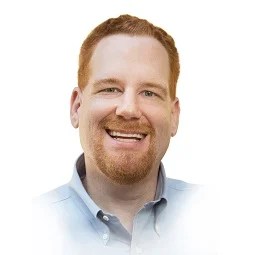
Terri Cole is a licensed psychotherapist and global relationship and empowerment expert and the author of “Boundary Boss” and “Too Much.”
For over two decades, Terri has worked with a diverse group of clients that includes everyone from stay-at-home moms to celebrities and Fortune 500 CEOs. She has a gift for making complex psychological concepts accessible and actionable so that clients and students achieve sustainable change.
She inspires over a million people weekly through her blog, social media platform, signature courses, and her popular podcast, The Terri Cole Show. For more, see terricole.com.

Our host, Gabe Howard, is an award-winning writer and speaker who lives with bipolar disorder. He is the author of the popular book, “Mental Illness is an Asshole and other Observations,” available from Amazon; signed copies are also available directly from the author. Gabe is also the host of the “Inside Bipolar” podcast with Dr. Nicole Washington.
Gabe makes his home in the suburbs of Columbus, Ohio. He lives with his supportive wife, Kendall, and a Miniature Schnauzer dog that he never wanted, but now can’t imagine life without. To book Gabe for your next event or learn more about him, please visit gabehoward.com.
Producer’s Note: Please be mindful that this transcript has been computer generated and therefore may contain inaccuracies and grammar errors. Thank you.
Announcer: You’re listening to Inside Mental Health: A Psych Central Podcast where experts share experiences and the latest thinking on mental health and psychology. Here’s your host, Gabe Howard.
Terri Cole: Gabe, I’m so excited to be here.
Gabe Howard: I am really excited that you’re here because I want to confess I have a lot of confusion surrounding codependency. See, in in my mind, codependent implies that two people are in an unhealthy relationship and that generally both people are contributing more or less equally to that unhealthiness. But I did a little research because I want to be prepared to interview you, so I don’t sound completely foolish. And it seems like the definition of codependency is one person is codependent and the other person is an enabler. Now, am I conceptualizing codependency incorrectly?
Terri Cole: I think that there’s like there’s roles that we play in codependent relationships. So codependency itself is a relational behavior. So the way that I describe codependency is when one person is overly invested in the feeling states, the outcomes, the relationships, the decisions, the circumstances of the people in their life to the detriment of their own internal peace. Right. So we’re overly invested. We feel overly responsible for what’s happening in someone else’s life. So that is codependency.
Gabe Howard: But I think that the average person would think, but that’s my best friend, or that’s my spouse, or that’s my child, or that’s my business partner. So I’m heavily invested in the outcome because I love so deeply or care so much, or much or because I’m so heavily invested. And then in that way,
Gabe Howard: It’s rebranded as a good thing. Is
Gabe Howard: This something that people do? And then how would you know the line? Because I imagine that people do care about their friends, family, spouse, business partners, etc.
Gabe Howard: How do they know when they’re going too far?
Terri Cole: Well, I think that you can do a resentment inventory very quickly, because here’s the thing. When we’re giving from equanimity and love, we don’t feel resentful. We’re happy to do what we’re doing. It’s not a problem when you’re codependent and you’re giving your grade-A advice to people. You’ve got amazing ideas. You can’t stop auto advice giving for all the people. Like, I just cannot wait to tell you what to do. But then if people don’t take your advice, you’re not feeling that good about it. You’re kind of mad or you’re over giving, and you eventually feel underappreciated because you’re giving from a place of not just love giving from a place of control. So I think that when people are like, I wonder if I’m codependent. The first question is, how resentful are you in your relationships? That could be. That’s a good GPS. When you do a resentment inventory to go I might want to look at my relational pattern in that relationship.
Gabe Howard: What is a resentment inventory? And how can I take one to see if my level of resentment is healthy or codependent, or if I’m just having an off week? I know a lot of people make a lot of excuses for the negative feelings they have about people who they love and care about.
Terri Cole: Here is the thing about resentment. I will disagree with you and say, I don’t think it’s necessarily a healthy emotion. Anger can be a healthy emotion. I’m disagreeing with someone as a is a healthy way of interacting. Resentment. What does it mean? It means that we’ve let something fester, right? Because you let a feeling like anger or you you have not said something, you feel underappreciated or you feel taken advantage of, and you keep not saying something. And now this is there’s an accumulation of feelings from not saying something. And this is where resentment comes in. So I think that having a feeling of disliking something, disagreeing with something, being mad at someone, feeling angry, all of those. And listen, resentment too. I’m not saying we’re not allowed to have these emotions, but to me, resentment means that something’s been festering for a while. And as a therapist, I think that identifying what is bothering you, what are you feeling resentful about? And figuring out a way to have that conversation. Set a limit. Set a boundary. Make a simple request to the other person, or simply let them know. Because honestly, Gabe, so much of the time with my therapy clients, they’re not saying anything and they’re assuming that the other person can read their mind. Right. I’m like, you haven’t even given them a chance to care about how you feel. So having open an open dialog and learning that the language of boundaries and being healthy, like knowing what is your side of the street, what is someone else’s side of the street, that’s really how we can get into recovery from codependency.
Gabe Howard: And once we experience that truth, once we realize that we resent somebody who we look up to, who we love, who we value. Is that an indicator of codependency? A potential indicator of codependency? How do we how do we suss that out?
Terri Cole: Well, definitely, resentment and codependency go hand in hand for the person who is over functioning and over giving and over feeling and over feeling overly responsible for all the things. So my thought is if you have a decent amount of resentment in your relationships, it is there’s a high likelihood and we can’t say conclusively. Right. Because psychological stuff, this is a soft science and people are very complicated and very complex, as you know, and all very different. But I think that it’s safe to say there is probably boundaries being crossed, which is what if we look at codependency, what it is, it’s so much of it has to do with disordered boundaries. We don’t know what is our side of the street. We feel like I’ll give you an example of codependency in my own life that I share in the book as well. One of my sisters was in a bad situation, in a bad relationship with someone who was abusive. She was living in a shack in the middle of the woods without running water and without electricity, and with a guy who was doing crack. She was drinking. It drinking. It was like a very bad scene. And so I was desperately trying to save her and thinking of all the ways, like, what is it? What do I have to do? And I was going into my therapist week after week, crying, being like, what am I going to do? And finally she said, Terri, let me ask you something. What makes you think you know what lesson your sister needs to learn in this life? And I was like, I mean, I think we can agree that she doesn’t need to do it with this abusive idiot in the woods without running water.
Terri Cole: I mean, can we agree to that? And she said no because I have no idea what she needs to learn. And I’m not God, and neither are you. And she said, do you understand what’s happening? And I said, no, obviously not. Please clue me in. And she said, you’ve worked really hard to create a pretty harmonious life. Your sister’s life being a dumpster fire is really messing with your peace. You want to fix that? And for her to be fixed so that you can go back to your peaceful life. And I was like, okay, but is that wrong? Like she’s my sister. How can I how can I not, you know, as you were saying before, right? I thought this was love. And she said, what you need to do is set boundaries. You don’t want her to talk to you every day about this abusive guy. You don’t want to deal because it was so stressful. Like my nervous system was. Forget it. I was a basket case about it. Crying all the time. Just couldn’t think of anything else. And so I learned from, with the help of this very lovely therapist, that I could set a boundary with my sister. I could still love her, but that her situation was not mine to fix. And that I couldn’t fix it. And she basically made it clear. So to me, she’s like, it’s not that you shouldn’t save your sister, it’s that you can’t because she it’s her situation.
Terri Cole: So what I did is I called my sister and said, hey, I love you when you are ready to get out of there. I’m still your person no matter what happens. But I can’t. I need to step back because it’s so disruptive for me. Made me feel terrible to do it. I was felt very selfish. But what I learned was that that was the truth. That’s what I could do. I could set a boundary. She called me nine months later. Hello? Are you still my person? I’m ready to get out. I was like, I’m getting in my car. She left. And here’s the takeaway of that whole story is that instead of me being the hero in Jenna’s story. Jenna is the hero in her story, right? She wouldn’t have gotten what she needed to do if I had ripped her out of there and paid money and did all the things I was trying to do, and she got sober herself. She went back to school. She has a different career. She did not go back with that person. She did not end up in another abusive relationship because that was her journey and what she needed to do. Me trying to control it was me being attached to her in a codependent way. And what I did was I drew a boundary and had respect for her sovereignty. It is her life to decide. And it’s not about my inconvenience or my feelings about her situation. Does that make sense?
Gabe Howard: It does. And I’m curious just to make sure that that I understand and that the listeners understand in in that example, were you the codependent one? And she was not codependent? Were you both codependent and enabling each other? Where how does that work itself out?
Terri Cole: I mean, in a way, it’s a codependent dynamic, which means that both people are participating, right? My sister was participating because she was calling me for advice. I was participating because I was giving advice. She would hang up after telling me all these terrible things and be be like, I always feel so much better after talking to you. And I would think I always feel like a toxic waste site after talking to you, because it felt like just this toxicity coming into me, I would absorb it. So we were both participating. But there’s different roles that you play. I was playing the savior. She was the victim in this scenario, right? I was playing the role of the wise one who I knew better, and the truth that I learned, which was very humbling and very hard to deal with. For me, being the hero child in my family system, that it wasn’t my situation to manage and that I could be there for my sister and be loving and not take over her situation, not center her situation on me and my grade-A advice. She needed to do it for herself. I got to be in her front row and to support her appropriately rather than controlling the
Gabe Howard: More often than not, when we hear about codependency, we think there’s a mental health crisis involved or there’s addiction involved, or both. Does codependency exist in other areas away from abusive relationships, drugs and alcohol, and mental health issues?
Terri Cole: Such a good question, Gabe. And oh, the answer is a resounding yes. It does. Which is why I literally wrote a whole book about it, because the way high functioning codependency presents, and something that’s different about this than sort of your codependent no more codependency, is that high functioning codependence we have a tendency to be codependent with the world, right? I could become codependent attached when I was in my 20s to like my mailman, my hairdresser, anybody. Where any any other person’s situation I could take on as my own and be like auto advice, giving all day long, getting invested in what? What Phil, my mail carrier His love life, like it was. It was bad where I couldn’t never just mind my own business and stay on my own side of the street. So, in the book I make the distinction between what is caring, what is codependent, and what is controlling, because they’re all different things, but they can feel a lot alike.
Gabe Howard: And I think that’s part of the problem, right? They can feel a lot alike. And I know there’s a lot of rebranding. I know that we hear about a lot of people who their relatives asked them for a lot of favors, and they constantly do it. And they say it’s because I have a big heart. And then there’s another member of the family that says, no, it’s because you’re a doormat, right? It’s
Gabe Howard: Because you’re tolerating too much, you’re enabling, you’re codependent, etc. But to that person, they believe it’s because they have a big heart and they believe it’s the kind thing to do. But I imagine that our listeners listening to this, they’re starting to realize that they are codependent, or at least they’re suspicious
Gabe Howard: Of it, or somebody has asked them to listen to this for a reason so that maybe they recognize themselves. So let’s say that that is starting to, to take shape. It’s starting to bloom.
Gabe Howard: They’re like, oh, maybe I am codependent. What are some first steps towards moving away from that? Keeping in mind they want to preserve the relationship.
Terri Cole: Well, part of it is getting really clear. So that’s where the resentment inventory comes in. If you’re in a relationship with someone you love, but you’re over functioning for them, you’re doing more than you really want to do for them because they ask you to, or because you think they expect you to. You need to write that down, right? We have to get clear about where are we overextending ourselves, because the cost for doing it is feeling resentful of the people that we love, right? Which of course is not good for our relationships, as we were saying before with resentment. So you start by really going, like, how do I feel in these relationships? Where am I over giving, overdoing, over functioning doing things for others that they can and should do for themselves? Whether that’s teenage kids, grown children? There’s a lot of over functioning that happens between in family dynamics, right? There’s a lot of this codependent. From from still booking your grown child’s travel plans to paying for their rent if they come up short month after month. And we feel like again, we feel like feel like this is the loving thing to do. But when you think about it, what are we actually doing? We’re robbing the other person of their experience that they need to learn to manage their money, or to learn how to book their own travel, or whatever it may be, that we again centering ourselves as the solution to other people’s problems. That’s not as loving as you think it is. That’s more selfish than you think it is because especially with children, don’t we want them to know the whole job of parents is like, we’re going to set you up to go out into the world and do your thing and to be a competent human being. Right. For you to actually be competent and to be able to do that. But when we center ourselves, kids do not become competent. They stay reliant on the parent.
Gabe Howard: I still think there are a good many people and I’m including myself in this. I want my listeners to know that they’re going to say, okay, you’ve kind of convinced me that there’s some codependency going on here, but but who cares? We’re both happy. Nobody’s getting hurt. How is this? How is this actually a problem? Sure, sure, sure. All of our friends and family say we’re codependent, but we’re fine. What do you have
Gabe Howard: To say to those folks?
Terri Cole: I say good for you. Honestly, here’s the thing, Gabe. I am not to say, however you interact in your relationship, if you actually are happy, then don’t change a thing. Right. This is for people who feel resentful, put upon, exhausted, underappreciated, tired, who would like to learn how to have more interdependent relationships instead of codependent relationships. This is for women in particular, who are hyper independent, who have difficulty letting other people add value to their life, letting other people do things for them. Difficult there. We’re the ones who always want to do for you. But receiving, right? That’s who this advice is for. If it’s hard for you to receive, if you find yourself going along to get along, if you say yes when you want to say no because you don’t want somebody to be upset or you want you want to be nice, right? Under this guise of being nice. So many of us have been indoctrinated into the cult of niceness. And trust me, if that is you, you know it’s you. Because you don’t feel good. You’re exhausted. You feel taken advantage of. You need a break. You feel burnt out.
Terri Cole: These are the. A lot of times, especially in my crew, the people who are in my community, my demographic. A lot of times we are helpers, healers, givers, therapists. We are the the E.R. nurses. We are doctors, right? We are the social workers. We’re really on the front lines. And I find it that there’s a difficulty in turning it off. Right. If you If you do this for a living, where it’s appropriate for you to be constantly dialed into everyone else’s feelings, we get so good at it that so many people say to me, I just go home and keep doing it. Like I don’t know how to stop over giving overdoing over functioning. But the thing that is very talked about, not a lot with codependency, is that it is an overt or covert bid to control. We are trying to control chaos. We are trying to control our environment and our relationships, and people don’t like to be managed. So if you are managing the crap out of all the people in your life, trust me, they resent you for it. It’s not the same as loving people, managing people, you know.
Gabe Howard: Well, it’s a bit controlling, right. And I think that maybe, you know, codependency has a sort of oh, well, we’re dependent on each other and we’re codependent. I think people have tried to rebrand it even as something positive. But if you say you’re controlling each other, you’re making decisions for each other and other, and you’re resentful to each other,
Gabe Howard: And your boundaries are unhealthy. All of a sudden, that has a much different ring than oh well, we’re codependent because I do hear a lot of people laugh and say, oh, my best friend and I are so codependent. Like, it’s okay, but
Gabe Howard: It when you when you really start to break it down, maybe they fight too much, maybe they make other people uncomfortable, or maybe they carry a lot of resentment and baggage and hostility toward each other that could eventually end the relationship. I do want the listeners to start putting themselves in those shoes, even though I imagine that the person who is just unwilling to change didn’t hit play at all.
Terri Cole: Right. That’s. They’re probably not listening to your podcast [Laughter].
Gabe Howard: They are probably not listening at all. So. So I do want to I want to slightly shift the question. Let’s say that those are your friends. You’ve hit play on this podcast because your best friend and her best friend, or your daughter and her best friend, or your son and his best friend are codependent, and you’re like, what do I do about this? How do I recognize this? How do I get them to realize it? Do you have any steps for the outside observer to take to get the codependent pair to realize what’s going on?
Terri Cole: I don’t, because I think the outside observer needs to really be staying on their own side of the street. And if you have a child who is who is exhibiting real codependent behaviors, trust me, is that apple did not fall far from the codependent tree. So I’d say we’re looking in and looking at our own relationships. What have you modeled for your kids? And here’s the thing. It’s not just about fighting, right? When we’re talking about, let’s say, people in codependent relationship, you’re talking about usually one person doing much more of the work than the other person. And it can be mutual, especially in female relationships where there’s control. I’m trying to convince you to do the thing I think that you should do. I’m judging what’s going on in your life. I’m over functioning for you. I’m doing things you’re not asking me to do. That’s more of the codependency, I think, in relationships. But in if we look at romantic relationships or relationships with parents and children, there is the over functioning. So much of the time it is the mother or the wife that is doing this. There is all of this invisible labor that we talk about that goes along with just keeping life going, and that adds to the sense of responsibility.
Terri Cole: If you’re the only one who’s making sure that the toilet paper gets replenished or whatever, that goes part and parcel with the high functioning, codependent lifestyle is that you’re doing all the things for all the people, and it’s exhausting. And again, we’ve got to go back to how you feel. If you feel great, no matter what you’re doing, great. It doesn’t matter. And as long as you’re not harming someone else. And I feel this way with alcohol and everything to where people would be would be like, well, I have a drink every day. And who are you to say that I shouldn’t? Nobody. If you have one drink every day and it feels good to you, go. Go again. This is just like your podcast is for us to have a deeper understanding of ourselves and to have the tools to change what’s not working in our lives. But it’s for people who feel like they need a change. If you identify with being like, wow, I’m burnt out, I’m exhausted. I am doing all the things for all the people. What do I need to do to change that so that I can have more bandwidth for me and my own pursuits? That’s really who this book and who this conversation is for.
Gabe Howard: I am curious though, what are the odds that this can be fixed? Because I know that codependent relationships are still important relationships with people who we need or love, or especially if it’s like a business partner or a family member,
Gabe Howard: We can’t just cut them off and end the relationship. I know you probably don’t have like the averages, but is this a repairable thing? Is this a worthwhile endeavor, or is this just to cut your losses and get out situation?
Terri Cole: No, this is absolutely. And really we’re talking about good better best. It’s not either codependent or perfect or codependent or ending the relationship. Right. We’re talking about how can we be healthier within our relationships. And that’s realizing am I over functioning for my adult child? Am I doing things for my partner that I’m resentful about, that they can and should be doing for themselves? Like it’s all I walk you through this in the book, all of the questions because you have a codependency blueprint just like everyone else does. Like it’s a relational blueprint. We learned how to relate from our family of origin. So it’s really about learning why you relate the way that you do and slowly but surely changing that. So I definitely I’ve helped tens of thousands of people over 27 years become healthier. And that’s the goal, right? The goal isn’t like codependent, not codependent at all. Like we’re human beings, we depend on each other, so we will have that connection. It’s just making that connection healthier so there’s less resentment and more joy.
Terri Cole: I sure do. You guys can get all the bonuses for purchasing the HFC book at HFCbook.com. And you guys, I spend most of my time on Instagram. So just @TerriCole and also my website to see all the places I’m going and all the things I’m doing. Just go to TerriCole.com.
Gabe Howard: Love that. Terri, thank you so much.
Terri Cole: Thanks for having me.
Gabe Howard: Oh, you are very welcome, Terri, and a great big thank you to all of our listeners. My name is Gabe Howard and I’m an award winning public speaker and I could be available for your next event. I also wrote the book “Mental Illness Is an Asshole and Other Observations,” which you can get on Amazon. But if you want to get a signed copy and get some free show swag, or you want to learn more about me, just head over to my website gabehoward.com. Wherever you downloaded this episode, please follow or subscribe to the show. It is absolutely free and you don’t want to miss a thing. And hey, can you do me a favor? Recommend the show. Share your favorite episode on social media. Send somebody an email. Send somebody a text message. Mention it around the water cooler. Sharing the show with the people we know is how we’re going to grow. I will see everybody next time on Inside Mental Health.
Announcer: You’ve been listening to Inside Mental Health: A Psych Central Podcast from Healthline Media. Have a topic or guest suggestion? E-mail us at [email protected]. Previous episodes can be found at psychcentral.com/show or on your favorite podcast player. Thank you for listening.




